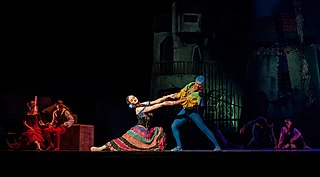
A performance is an act or process of staging or presenting a play, concert, or other form of entertainment. It is also defined as the action or process of carrying out or accomplishing an action, task, or function.

Experimental theatre, inspired largely by Wagner's concept of Gesamtkunstwerk, began in Western theatre in the late 19th century with Alfred Jarry and his Ubu plays as a rejection of both the age in particular and, in general, the dominant ways of writing and producing plays. The term has shifted over time as the mainstream theatre world has adopted many forms that were once considered radical.

Madiga is a Telugu caste from southern India. They mainly live in the states of Andhra Pradesh, Telangana and Karnataka, with a small minority in Tamil Nadu. Madigas are historically associated with the work of tannery, leatherwork and small handicrafts. Today, most are agricultural labourers. They are categorized as a Scheduled Caste by the Government of India. Within the Madiga community, there are various sub-castes include Bindla they work mostly known to make shoes, Chindu They are nomadic performing caste, Chindus constantly travel to different villages and live with Madigas they can be identified as worshippers of Yellamma diety, Dakkali, Dakkala or Dakkali is the name of a class of mendicants who beg from Mādigas only, Mashti, a nomadic tribe with martial art skills has by and large gone unnoticed in this part of East Godavari. They are unknown to many beyond the district and deprived of any support from the authorities. They are known as ‘Mala Mashtis’, Sangaris they are known for making handicrafts and wood carving. The priestly class is known as Madiga Dasu they are associated with temple worships and have had a long history of being agricultural land owners they are also worshippers of Venkateswara or Narasimha dieties.

The Unification of Karnataka or Karnataka Ekikarana refers to the formation of the Indian state of Karnataka in 1956 when several Indian states were created by redrawing borders based on linguistic demographics. Decades earlier during British rule, the demand for a state based on Kannada demographics had been made.

Telugu theatre is Indian theatre in the Telugu language, based in the states of Andhra Pradesh and Telangana. Gurajada Apparao wrote the play, Kanyasulkam in 1892, which is often considered the greatest play in the Telugu language. C. Pullaiah is cited as the father of Telugu theatre movement.
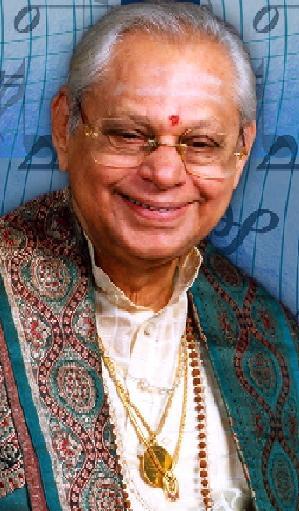
Mahamahopadhyaya Dr. Nookala Chinna Satyanarayana was a Carnatic musician, a classical vocalist, musicologist, author and teacher, a great administrator and motivator. He was a performer on All India Radio and Doordarshan who participated in Sangeeta Sammelans, outdoor broadcasts and national programmes innumerable times. His radio lessons and Bhakti Ranjanis were very popular. He was awarded Padma Bhushan award by the Government of India in 2010.
Sarada is an Indian actress and politician. Known for her work predominantly in Telugu films and Malayalam films, Sarada is the recipient of three National Awards. She has also appeared in few Tamil, Hindi as well as Kannada language films. She is also known as Urvasi Sarada – National Film Award for Best Actress was officially designated the Urvasi Award. She won three National Awards for her roles in Thulabharam (1968), Swayamvaram (1972), and Nimajjanam (1977). Sarada won the NTR National Award by the Government of Andhra Pradesh for her contributions to Indian cinema.
Vemuri Gaggayya (1895–1955) was an Indian actor and singer known for his works in Telugu cinema, and Telugu theatre.

The Board of Intermediate Education, Andhra Pradesh (BIEAP) is a board of education in Andhra Pradesh, India. Established in 1971, it was located in Hyderabad, situated in the composite Andhra Pradesh state. The board is now located in Vijayawada after state reorganization in 2014. The board offers two-year courses in 85 streams and courses and conducts examinations.
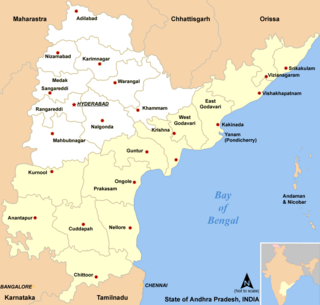
The Telangana movement refers to a movement for the creation of a separate state, Telangana, from the pre-existing state of Andhra Pradesh in India. The new state corresponds to the Telugu-speaking portions of the erstwhile princely state of Hyderabad, which were merged with Andhra Pradesh in 1956, leading to the Mulki Agitations.
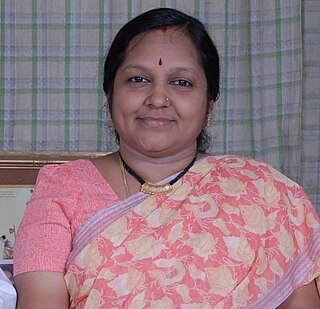
Dr. Seshulatha Kosuru is a leading Carnatic musician and teacher from Andhra Pradesh. She has performed widely in India and abroad and has received numerous awards and titles from many leading organizations. She has tuned and released many carnatic & devotional albums and has also set to tune many dance ballets.

Samaikya Andhra Movement was a movement organized to keep the Indian state of Andhra Pradesh united, and to prevent the division of the state - separating the Telangana districts of the state into a separate Telangana state. The movement was supported by government employees, advocates in Coastal Andhra & Rayalaseema regions along with students from 14 universities, various occupational, caste & religious groups of Coastal Andhra & Rayalaseema regions. The last set of protests were triggered after the Congress Working Committee decision to divide the state came to an end after President of India gave nod to Telangana Bill which would make the latter to come into existence from 2 June 2014.
It is not easy to trace out the origins of the Telugu folk literature, for that matter any folk literature. It is as difficult as tracing the origin of a language. In other words, one can argue that the origin and existence of any folk literature can be a parallel phenomenon along with that language, because the folk expressive traditions of any ethnic group are much earlier than the language of that particular ethnic group. Need not say about the developed literature in written tradition. The cave paintings and line drawings found in different archeological sites prove the ability of the creative expressions of prehistoric human beings even before they were not able to speak. The addition of verbal creativity in latter periods has widened the folk expressive tradition in another medium that is verbal folk arts or the folk literature. Therefore, the existence of any folk literature can go back to the time of the given language correspondingly.
Dasari Prasada Rao is an Indian Cardiothoracic surgeon. He was noteworthy for introducing the first open heart surgery to the state of Andhra Pradesh in India and for pioneering advanced medical care at affordable costs. Dasari Prasada Rao has won numerous awards including in 2001 the Padma Shri award, a Civilian award bestowed by the Government of India.
The Andhra Pradesh Reorganisation Act of 2014, commonly known as the Telangana Act, is an Act of Indian Parliament that split the state of Andhra Pradesh into Telangana and the residuary Andhra Pradesh state, as an outcome of the Telangana movement. The Act defined the boundaries of the two states, determined how the assets and liabilities were to be divided, and laid out the status of Hyderabad as the permanent capital of new Telangana state and temporary capital of the Andhra Pradesh state.

Amaravati is the capital city of the Indian state of Andhra Pradesh. It is situated in Guntur district at the heart of the state, on the right bank of the Krishna River and south west of Vijayawada. It is named after the historic Amaravathi site adjacent to Dharanikota, the ancient city, that served as the capital of the Satavahana dynasty more than 2,200 years ago. The Andhra Pradesh Capital Region encompasses the neighboring cities of Guntur, and Vijayawada.
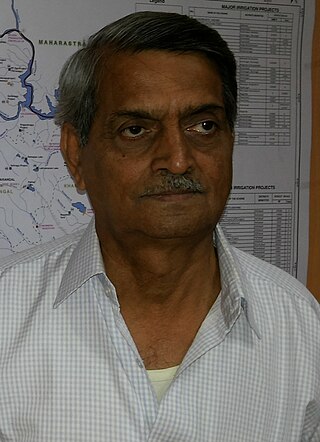
Ramaraju Vidyasagar Rao was an Indian government administrator and a Telangana activist. He was the Chief Engineer of the Ministry of Water Resources, Central Water Commission. After the formation of Telangana State, he was appointed as the Advisor on Irrigation to the Government of Telangana. He was the foremost expert on irrigation projects in Telangana, and was instrumental in highlighting injustices in water allocation for Telangana Region in United Andhra Pradesh.

Violin Vasu is an Indian classical music violinist, music teacher, researcher and a social activist. He belongs to the sixth generation of Saint Tyagaraja Sishya Parampara (lineage) and teaches at IIT Hyderabad.
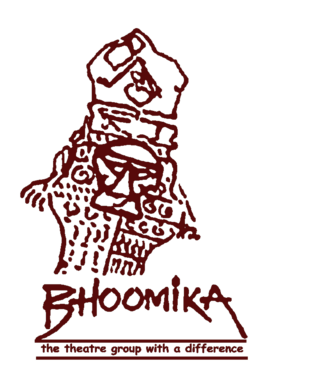
Bhoomika is an Indian Theatre group based in Hyderabad. It was founded in 1989 by Udaya Bhanu Garikipati. The group began its first production in 1989 with Kaki Bangaram, an adaption of Vijay Tendulkar's Pahije Jathiche. It later produced various original plays as well as adaptations in Telugu, Hindi and Deccani.














